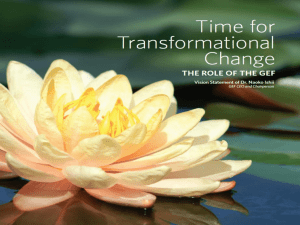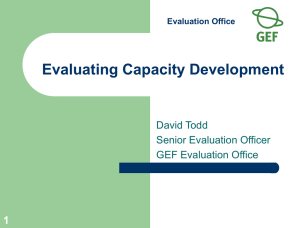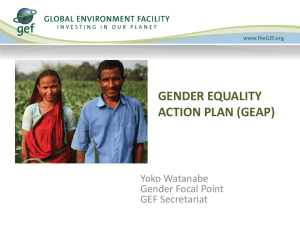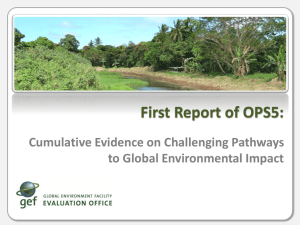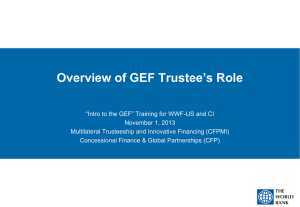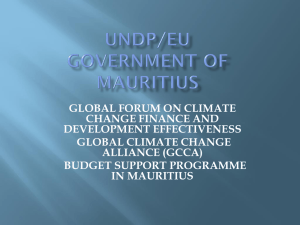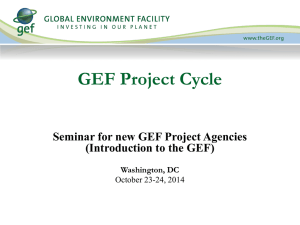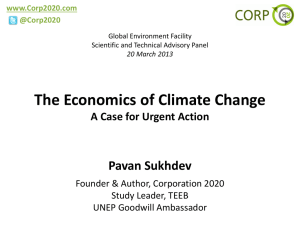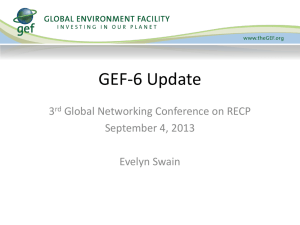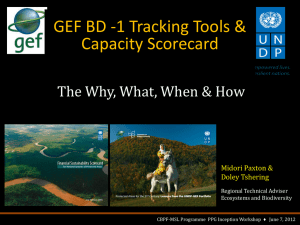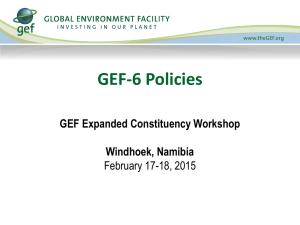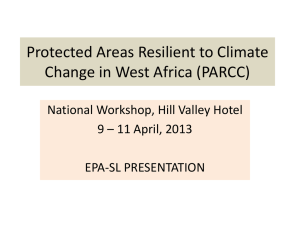Project Cycle and Accessing the GEF
advertisement
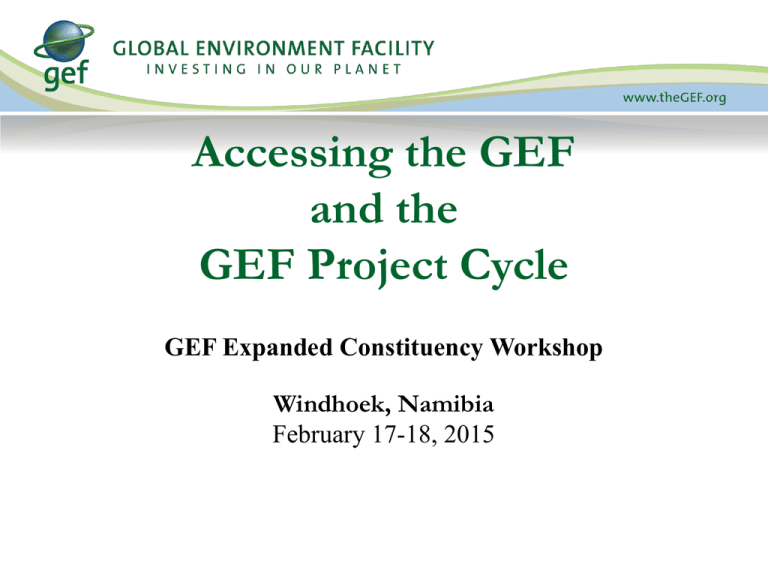
Accessing the GEF and the GEF Project Cycle GEF Expanded Constituency Workshop Windhoek, Namibia February 17-18, 2015 GEF Financing Financing Objective: • to provide resources to recipient countries to meet the agreed incremental cost of activities that generate global environmental benefits (GEBs). • GEF Trust Fund, Least Developing Countries Fund (LDCF), Special Climate Change Fund (SCCF) & Nagoya Protocol Implementation Fund (NPIF). Who can apply? • A GEF country member government, any eligible individual or group may propose a project through the OFP. • GEF Operational Focal Point (OFP) plays a key role in assuring that GEF projects are aligned to meet the needs and priorities of the respective country. Eligibility of Project Proposal A project proposal has to fulfill the following criteria for consideration for GEF financing, : • It is undertaken in an eligible country and is consistent with country’s national priorities and programs. • It addresses one or more of the GEF Focal Area objectives in improving the global environment or advancing the prospect of reducing risks to it. • It is consistent with the GEF operational strategy. • It seeks GEF financing only for the agreed incremental costs on measures to achieve global environmental benefits • It involves the stakeholders in project design and implementation. • It is endorsed by the government(s) of the country/ies in which it will be implemented. Accessing the GEF Trust Fund TRADITIONAL MODE • Project proponents work closely with national GEF Operational Focal Points (who formally endorse project concepts) and the GEF Partner Agency, to develop concepts and move through the project cycle and are approved either by the GEF Council or the GEF CEO, depending on the type of project. DIRECT ACCESS MODE • In response to country request to improve country ownership, country drivenness and capacity building • Project proponents work directly with the GEF Secretariat without going through a GEF Agency; projects follow the same project eligibility criteria and focal area strategic objectives. Types of GEF Projects GEF project types by Grant Size: • Full-Sized Projects (FSPs): GEF grant > $2 million • Medium-Sized Projects (MSPs): GEF grant < $2 million • Enabling Activities (EAs): GEF grant is capped by respective focal area threshold: Biodiversity and Climate Change = up to $500,000; Land Degradation = up to $150,000 Chemical and Waste (MIA = $200,000; Persistent Organic Pollutants and ASGM NAP=$500,000) • Programmatic Approach (PA) • Small Grants Program (max $50,000) MIA=Minamata Convention Initial Assessment ASGM NAP = “Artisanal and Small Scale Gold Mining” National Action Plan Project Cycle Steps Two major approval steps for Full-Sized Projects: Council and the GEF Secretariat: 1. Council approval of work program 2. CEO endorsement of the project document GEF Agency: 1. Approval of the project by the GEF Agency and implementation start; 2. Completion of implementation, terminal evaluation and financial closure. Full-Sized Project Cycle Council approval of Work Program* Project implementation and continues to completion*** CEO endorsement of project GEF Agency approval of project** * Work Program consists of PIFs cleared by the CEO ** GEF Agency approval of project signifies start of project implementation *** Project completion follows terminal evaluation and financial closure Medium-Sized Project Cycle One-step approach, preferred: • Final MSP request and project document submit to the Secretariat for CEO approval, on a rolling basis. • As needed, a PPG of up to $50,000 can be requested with MSP submission. Two-step approach, only if required: • Submission of a PIF with PPG request, if needed • Submission of a final MSP document plus a MSP Approval Request for CEO approval Enabling Activities Project Cycle Enabling Activities follow two paths: Direct Access (follow direct access policy – applies the World Bank Operations Policies and Procedures): Country applies directly to the Secretariat for funding Regular procedures : Country works with a GEF Partner Agency to access funding. Programmatic Approach Cycle The new programmatic approach: approved by Council approval in the October 2014 Council meeting. Steps include: Council approval of a Program Framework Document (PFD) included in a work program; CEO endorsement of fully prepared child projects under the program Features of a Program Key document: Program Framework Document (PFD). All child projects under the Program have to be submitted for CEO endorsement by a deadline (or Program Commitment Deadline) agreed by relevant stakeholders during the preparation of the program concept or PFD. Child projects can apply for project preparation funding through submission of a PPG Request. Project Review Criteria Country eligibility and ownership Global Environment Benefits GEF Focal area strategy Agency’s Comparative advantage Resource availability Project consistency Project design Project financing and co-financing Monitoring and evaluation; and Agency’s responses to comments and reviews. Country Endorsement Endorsement by a national Operational Focal Point (OFP) is a requirement for the following: all PIFs to enter the work program, and for application of Project Preparation Grants (PPGs); PFDs submitted for work program inclusion; Request for CEO approval of MSP final projects; All EAs requesting CEO approval. Projects in biodiversity, climate change, and land degradation focal areas also follow STAR rules. Acronyms Used in this Presentation FSP = Full-Sized Project MSP = Medium-Sized Project EA = Enabling Activities PA = Programmatic Approach MIA=Minamata Convention Initial Assessment ASGM NAP = “Artisanal and Small Scale Gold Mining” National Action Plan PIFs = Project Identification Form/concept of a project PFD = Program Framework Document PPG = Project Preparation Grant Recent Council Papers on Project Cycle Please consult the GEF website: www.thegef.org for all relevant project cycle papers for more detailed policies and procedures. To name a few: GEF/C.31/7/Corr.1 GEF Project Cycle (Corrigendum) English GEF/C.38/05/Rev.1 Streamlining the Project Cycle and Refining the Programmatic Approach English GEF/C.39/Inf.03 GEF Project and Programmatic Approach Cycles English GEF/C.43/06 Streamlining of Project Cycle English GEF/C.47/07 Improving the GEF Project Cycle English . Thank you for your attention! Questions? Lily Uy Hale (Lhale@thegef.org) Sr. Operations Officer Operations and Business Strategy GEF Secretariat
